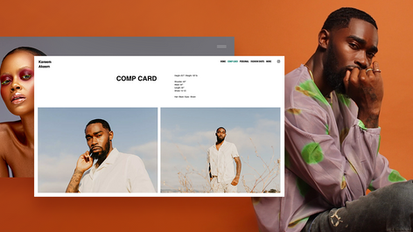Digital Portfolio Website Portfolio Case Study Device Generator Explained
What Is Digital Portfolio Website Portfolio Case Study Device Generator?
Digital Portfolio Website Portfolio Case Study Device Generator
In today’s digital age, having a strong online presence is essential for churches to effectively reach and engage with their congregation. A well-designed website can serve as a powerful tool for communicating important information, sharing resources and sermons, and connecting with members and visitors. However, creating a website from scratch can be a daunting task, especially for those without technical expertise. That’s where church website builders come in – these platforms offer easy-to-use tools and templates specifically tailored for churches, making it simple to create a professional and engaging website. In this article, we will explore some of the best church website builders available, and discuss their features and benefits.

Digital Portfolio Website Portfolio Case Study Device Generator Explained
Digital Portfolio Website Portfolio Case Study Device Generator
Website builders are tools that allow users to create a website without needing to know how to code. They provide pre-designed templates and intuitive drag-and-drop features that make it easy for even the least tech-savvy individuals to create a professional-looking website. With hundreds of website builders available on the market, choosing the best one for your small business can be a daunting task. In this article, we will discuss some of the best website builders for small businesses to help you make an informed decision.
1. Wix
Wix is one of the most popular website builders on the market, and for good reason. It offers a wide range of professionally designed templates that are customizable to suit your business’s branding and style. Wix also has a user-friendly drag-and-drop interface that makes it easy to add text, images, videos, and other elements to your website. In addition, Wix offers a variety of features such as e-commerce functionality, blog integration, and SEO tools to help you optimize your website for search engines.
2. Squarespace
Squarespace is another highly popular website builder known for its sleek and modern templates. It is a great choice for small businesses in creative industries such as design, photography, or fashion, as Squarespace’s templates are visually striking and can be easily customized to showcase your work. Squarespace also offers e-commerce functionality, blogging capabilities, and built-in SEO tools to help you attract more visitors to your website.
3. Weebly
Weebly is a user-friendly website builder that is perfect for small businesses looking to create a professional-looking website quickly and easily. Weebly offers a variety of templates that are fully customizable, along with drag-and-drop functionality that allows you to create a website without any technical expertise. Weebly also provides e-commerce tools, blogging capabilities, and SEO features to help you grow your online presence.
4. Shopify
If your small business is primarily focused on selling products online, Shopify is the website builder for you. Shopify is an e-commerce platform that allows you to create a fully functional online store with ease. It offers a variety of customizable templates specifically designed for e-commerce, along with features such as inventory management, payment processing, and shipping options. Shopify also provides built-in SEO tools to help you attract more customers to your online store.
5. WordPress
WordPress is a powerful content management system that allows you to create a highly customizable website for your small business. While WordPress is more complex than some other website builders, it offers unparalleled flexibility and control over your website’s design and functionality. With thousands of plugins and themes available, you can create a website that perfectly suits your business’s needs. WordPress also provides e-commerce capabilities, blogging features, and SEO tools to help you create a successful online presence.
Here are some of the top web design trends to watch out for in 2021:
1. Dark Mode:
Dark mode has been a popular trend in web design for the past few years, and it continues to gain momentum in 2021. Dark mode not only looks sleek and modern but also reduces eye strain and improves readability in low-light environments. Many websites now offer a toggle switch that allows users to switch between light and dark modes based on their preference.
2. Neumorphism:
Neumorphism is a design trend that combines elements of skeuomorphism and flat design to create a soft, realistic look. It involves using subtle shadows, highlights, and gradients to make elements appear three-dimensional and tactile. Neumorphic design can create a more immersive and engaging user experience, making websites feel more interactive and intuitive.
3. Minimalism:
Minimalism has been a popular design trend for years, and it continues to be relevant in 2021. Clean and simple designs with plenty of white space help focus users’ attention on key elements and create a sense of calm and balance. Minimalist websites load faster, are easier to navigate, and convey a sense of sophistication and professionalism.
4. Custom Illustrations:
Custom illustrations are a great way to add personality and character to a website. They can help showcase a brand’s unique identity and differentiate it from competitors. Custom illustrations can be used to explain complex concepts, guide users through the website, or simply add a touch of whimsy and creativity to the design.
5. Asymmetric Layouts:
Asymmetric layouts break away from the traditional grid-based designs and create a more dynamic and visually interesting website. They can help draw attention to specific elements, create a sense of movement and flow, and make the design more memorable and engaging. Asymmetric layouts can be challenging to implement but can result in a truly unique and striking website.
6. 3D Elements:
3D elements add depth and dimension to a website, making it more visually appealing and immersive. They can be used to create interactive product showcases, engaging animations, or eye-catching backgrounds. With advancements in CSS and JavaScript, 3D elements are becoming easier to implement and can help create a more memorable and engaging user experience.
7. Bright Colors:
Bright and bold colors are being used more frequently in web design to grab users’ attention and create a strong visual impact. Vibrant colors can help convey brand personality, evoke emotions, and create a sense of energy and excitement. When used strategically, bright colors can help highlight key elements and guide users through the website.
8. Micro-animations:
Micro-animations are small, subtle animations that add interactivity and delight to a website. They can be used to draw attention to important elements, provide feedback to user actions, or create a sense of continuity and flow. Micro-animations can help create a more engaging and intuitive user experience and make the website feel more dynamic and alive.
9. Voice User Interface (VUI):
With the rise of voice assistants like Alexa and Siri, voice user interfaces are becoming more prevalent in web design. VUI allows users to interact with the website using natural language commands, making navigation easier and more intuitive. Integrating VUI into a website can help reach a wider audience, improve accessibility, and offer a more convenient user experience.
10. Accessibility:
Accessibility is an important consideration in web design, ensuring that websites are usable by people of all abilities. In 2021, there is a growing focus on creating accessible websites that adhere to WCAG (Web Content Accessibility Guidelines) standards. This includes features like alt text for images, proper heading structures, keyboard navigation, and color contrast ratios. By designing with accessibility in mind, businesses can reach a larger audience and demonstrate their commitment to inclusivity and diversity.

Digital Portfolio Website Portfolio Case Study Device Generator Tips and Tricks
Digital Portfolio Website Portfolio Case Study Device Generator
In conclusion, there are many affordable website builders available that can help you create a professional-looking website without breaking the bank. Wix, Weebly, Squarespace, and WordPress.com are just a few examples of website builders that offer a range of features and customization options at an affordable price. Whether you’re looking to create a personal blog or an e-commerce site, there is a budget-friendly website builder out there that will meet your needs. So, don’t let cost be a barrier to creating the website of your dreams – with the right website builder, you can bring your vision to life without spending a fortune.


